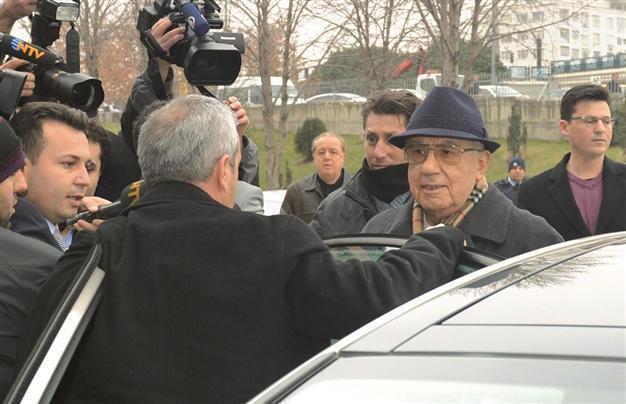Turkey's former top general Karadayı released
ISTANBUL

Former Chief of General Staff Karadayı (R) is taken from his house by two policemen preparatory to his transfer to Istanbul Courthouse to pass a procedural medical check before being sent Ankara to testify in front of prosecutors. AA photo
Turkey’s former Chief of General Staff İsmail Hakkı Karadayı was released on conditions of trial without arrest. Karadayı will reportedly be kept under judicial control. He is banned from leaving the country and is obliged to sign papers every week in police office.
Karadayı who has recently left the court, is expected to return to Istanbul with a civil vehicle.
He was sent to court for arrest earlier today in the capital of Ankara after responding to 83 questions during his almost 4-hour long testimony.
Turkey's former top general nabbed in coup caseTurkey’s former military chief, İsmail Hakkı Karadayı, was detained yesterday as part of the ongoing Feb. 28 probe before being sent to Ankara to testify as a suspect over his alleged role in toppling Turkey’s Islamist government in the “post-modern coup” of 1997.
The judicial action came after Çevik Bir, a retired general who is behind bars in the same investigation, issued a criminal complaint about Karadayı, from whom he took orders. The detention of Karadayı raised questions as to whether the probe will be expanded to include civilians who took part in the alleged plot.
Karadayı’s testimony to Ankara prosecutors ended late yesterday when the Hürriyet Daily News went to print.
Another former Chief of General Staff, Gen. İlker Başbuğ, is currently being held under arrest in connection with the Ergenekon case, which aims to unravel an alleged ultra-nationalist gang accused of planning to topple the government. Some 62 people, including top retired and on-duty officers, as well as many civilians, were arrested in earlier waves.
Although Karadayı’s lawyer, Erol Yılmaz, said there had been no custody decision, order for an arrest or search warrant against his client, Karadayı was taken from his house by two policemen and brought to Istanbul Courthouse to pass a procedural medical check. He was later brought to Ankara under police supervision to testify before Ankara prosecutors Mustafa Bilgili, Kemal Çetin and Murat Esen who are currently investigating the Feb. 28 process, the 1997 army-led campaign that led to the resignation of the government of the time.
A senior official with the Justice and Development Party (AKP) described the detention of Karadayı as part of Turkey’s ongoing normalization process.
“It is impossible not to settle scores with undemocratic and unlawful implementations of the past while Turkey is normalizing and moving toward a stronger democracy,” AKP Deputy Chair Mehmet Ali Şahin said.
Deputy Prime Minister Bekir Bozdağ, however, was cautious. “It is an ongoing judicial process. Since the judicial process is underway, it wouldn’t be right to make a comment on the substance of the matter. It will be useful to see the process all together,” Bozdağ said.
A group of Workers’ Party (İP) members protested the detention, shouting slogans in favor of the Turkish Armed Forces (TSK). A minor confrontation also occurred between the protestors and security forces in front of the Ankara Courthouse.
Karadayı had previously stood before a parliamentary panel into past military coups and answered questions from both ruling and opposition party deputies. In his comments, he denied that he used the word “post-modern coup” and said he thought this was a stupid definition of what happened in 1997.
The definition is believed to belong to Erol Özkasnak, another former general who is thought to have played a key role in pushing Prime Minister Necmettin Erbakan’s government from power.
Bir’s criminal complaint came nearly two weeks after Karadayı’s statements appeared in the media, suggesting that there is a fight between the old military comrades.
In his 11-page complaint, Bir gave detailed information on how the West Study Group (BÇG) was founded and claimed Karadayı also had knowledge about the group. Karadayı had previously told Parliament’s Coup Inquiry Commission that he did not know anything about the BÇG.
The BÇG is a committee of military officials that is said to have monitored the government, keeping illegal records of private information about hundreds of thousands of people as part of the Feb. 28 process.
The “post-modern” coup, or the Feb. 28 process, refers to a military intervention that forced the late Erbakan to resign. The process is named for the Feb. 28, 1997, meeting of the National Security Council (MGK).
Key figure in Feb 28 move
ANKARA - Hürriyet Daily News
Retired Gen. İsmail Hakkı Karadayı was the chief of General Staff during the Feb. 28 process, a 1997 army-led campaign that led to the resignation of Turkey’s first Islamist government under Necmettin Erbakan. In 2011, judicial authorities in the case arrested dozens of military officers, many of whom accused Karadayı, 81, of responsibility for the process.
Retired Gen. Çevik Bir, who was Karadayı’s deputy in 1997 and who was arrested last year, filed an official complaint about Karadayı and explained that the latter was well-informed about the West Study Group (BÇG), which was central to the process.
